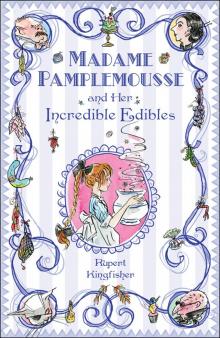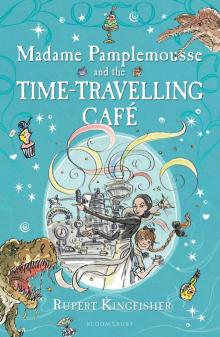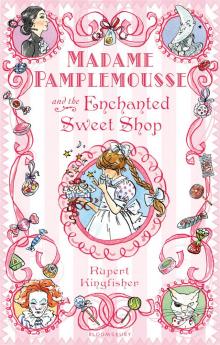- Home
- Rupert Kingfisher
Madame Pamplemousse and the Time-Travelling Café
Madame Pamplemousse and the Time-Travelling Café Read online
g
g
For Rosie and the Caterpillar
g
Contents
Chapter One
Chapter Two
Chapter Three
Chapter Four
Chapter Five
Chapter Six
Chapter Seven
Chapter Eight
Chapter Nine
Chapter Ten
Epilogue
Also by Rupert Kingfisher
Imprint
Chapter One
In the city of Paris, in the district of Montmartre, at the top of a steep, winding hill, there is a café. An old-fashioned and eleganly furnished café, with polished wooden tables, frosted-glass windows and an awning of striped gold and green.
Inside, the walls are adorned with posters: vintage advertisements for drinks from ages past, such as Mermaid Madeira, Green Fairy Liqueur, Dark Horse Chocolate and Red Devil Lemonade.
Other strange-looking antiques are distributed all around – pieces of marble and old statues, carved figureheads and masks – giving the café the appearance of a small museum. And this is perhaps how it acquired its title: The Café of Lost Time.
However, the true reason for its name is a secret, a secret housed within the gleaming, silver steam-powered espresso coffee machine sitting atop the café bar.
The machine was invented by the café’s owner, whose name is Monsieur Moutarde. Moutarde was once a famous scientist, a professor at the university, who resigned from his professorship quite suddenly one day, after making the most remarkable discovery.
The discovery came to him on a Sunday afternoon while out with his nephew and niece. They were looking round the dinosaur gallery in the Museum of Natural History, when Monsieur Moutarde paused to admire the skeleton of a diplodocus.
There was something about its mere presence there that never ceased to amaze him – how this was no replica but the actual bones of a creature that had once walked the Earth, many millions of years ago. And yet here it was standing right next to him.
Afterwards they went to a café where Monsieur Moutarde ordered a particular kind of orange-flavoured cake that had been a favourite of his as a child. He had not eaten one since and only ordered it on a whim. But at the first taste he had such an intense memory of childhood that, for a second, he actually believed himself back in the past.
‘Eureka!’ he exclaimed, suddenly leaping from his chair. The other people in the café looked up warily, although his niece and nephew didn’t bat an eye, for they were used to this sort of behaviour from their uncle.
‘That’s it!’ he cried euphorically, pacing briskly up and down. ‘The taste brings back the memory, just like you’re really there. So you’d only have to trick the universe into agreeing with your senses and . . . sacré bleu! Why, then you would have time travel!’
‘Except it wouldn’t work!’ he explained later, dejectedly, to a friend. ‘Tricking the universe is no problem – that’s the easy part – but it would only work with your own memories. What about times you’ve never experienced? Or times before human beings even existed?’
His friend shrugged. ‘Surely it’s only a matter of imagination?’ she said.
‘Well, yes, of course, but an imagination of genius!’
‘That shouldn’t pose too much of a problem,’ said his friend. And indeed, for her, it would not, since her name was Madame Pamplemousse, and she was the greatest culinary genius the world has ever known.
So together they invented the Taste-Automated Space-Time Déjà-Vu Generator. Monsieur Moutarde designed the machine, while Madame Pamplemousse devised the recipes – special blends of ingredients whose flavours vividly recalled the past. These ingredients would then be fed into the Generator, where they would be subatomically blended with quantum froth and spritzed with space-time foam. Finally, the resulting liquid would be dispensed into a cup and look much like a small black coffee. Except that whoever drank this liquid would be transported through time and space.
No sooner had they built the machine, however, than they realised the potential dangers of their discovery. For who knew what terrible uses it might be put to if the Generator fell into the wrong hands?
So Madame Pamplemousse and Monsieur Moutarde chose to hide it. Given its remarkable similarity to a coffee machine, Moutarde had the ingenious idea of concealing it inside a café. And so he resigned from his position at the university and became a café owner instead.
The café actually did quite well and acquired something of a reputation throughout Paris. This was partly due to its unusual decor and museum-like appearance, and partly due to the strange rumours it attracted.
It was widely believed, for example, that the café was haunted. For there were reports of people glancing through the windows at night, and seeing figures inside who would then mysteriously vanish before their eyes. Or there was another, particularly fanciful story from someone claiming to have seen a cat standing on its hind legs and leaning against the bar. The cat had also, apparently, worn an eyepatch and had been sipping an apéritif.
Madame Pamplemousse ran a shop called ‘Edibles’ on the banks of the river, just off the main street down a narrow, winding alley. It was a small and rather unremarkable-looking shop but, in fact, sold some of the most extraordinary food ever tasted.
It had, for example, several hundred different cheeses, some of them dating back many centuries. One in particular was so oozing and putrid that it had to be kept chained up beneath a thick marble lid.
Among the giant cured meats hanging from the ceiling there was Smoked Pterodactyl Wing, Salted Ichthyosaur Fin and Triceratops Tail with Garlic. All around the walls, winding up to the ceiling, there were shelves packed with jars and tiny bottles, with their contents written on the labels in fine, purple script: Pickled Tarantula Legs in Tarragon Vinegar, Black Mamba Tongues in Red Wine, Peppered Dragon Spit with Fairy-Ring Mushroom and Kraken Tentacle with Rose-Petal Jam.
She also sold one particular delicacy which had neither a name nor any ingredients on the label. This was because the ingredients were a secret, for it was The Most Incredible Edible Ever Tasted.
Madame Pamplemousse lived above the shop with her cat, Camembert, a stray who had wandered in off the streets one night, after being involved in a fight. During the fight, Camembert had nearly died and lost one of his eyes, but Madame Pamplemousse had nursed him back to health. And ever since they had lived together very happily. They would run the shop by day and, come sundown, would often share a bottle of Violet-Petal Wine on Madame Pamplemousse’s balcony above the city. And often they might be joined by their good friend Madeleine.
Madeleine was a girl who lived nearby above a restaurant called the Hungry Snail. She had recently been adopted by the restaurant’s owners, Monsieur and Madame Cornichon. This was only one of the incredible things that had happened to Madeleine since stumbling across Madame Pamplemousse’s shop. Another was that she herself had been discovered as an exceptionally talented cook.
However, this did have the slight drawback that Madeleine was regularly hounded by the press and television companies trying to persuade her to appear on children’s cookery shows. These offers she would always decline, preferring instead to remain anonymous. But she could not prevent people from taking her picture and printing it in the newspapers. And this is why, bright and early one morning, she received a visitor at the Hungry Snail.
Chapter Two
Sometimes Madeleine could hardly believe her luck, for it was only last summer that her whole life had changed.
No longer did she have
to live with her parents, which was just as well, since they had spent most of their time trying to get rid of her. Nor did she have to spend every holiday scrubbing dishes in her uncle’s restaurant.
Instead, Madeleine lived with the Cornichons in their apartment above the Hungry Snail. The restaurant had been redecorated according to Madame Cornichon’s instructions, and was full of light and space and fresh flowers. It was the sort of place that made you happy just by being there. Monsieur Cornichon devised the menus – although Madeleine was his chief consultant – and each week they would discuss what new recipes to include.
But from the time Madeleine used to live with her parents, she had developed a sort of rule or principle about the universe. And this rule stated: whenever you begin to really enjoy yourself, someone will always try to stop you.
She had even tested this law scientifically and found that whenever she performed some boring activity, such as homework or brushing her teeth, she would be left in perfect solitude. But the moment things took a more interesting turn, some adult would be there, telling her to stop.
It turned out that Madeleine’s Law was, indeed, as universal as she supposed. For last summer had been memorable for everyone in Paris, not for any special reason, just a general feeling in the air, a sense that things were possible where they had not been so before. But as the days got colder and the nights drew in, the President of France decided everyone had been having too much fun and that it was time to bring it to an end.
The President hated Paris. He loathed it with a passion. To him it seemed a lazy, slovenly city, where people did nothing but eat and talk and fall in love when they should have been doing something far more practical, like cutting down rainforests, instead. And so he began planning Paris’s systematic destruction.
All of the city’s older and more beautiful architecture was set for demolition, with hideous new buildings to be put up in its place. All of the parks, art galleries and museums were sold off to become shopping centres, and all the small, independent shops and restaurants were to be closed, to make way for multinational chains. And in these chain restaurants strict time limits would be imposed on how long people were allowed to dine. Gone were the days when you could spend whole afternoons having lunch, and dancing the night away was now strictly forbidden.
The minister responsible for administering these new laws was the President’s second in command: a young woman by the name of Mademoiselle Fondue. And it was she who, early one Saturday morning, was knocking on the restaurant door.
Madeleine was still in bed when she heard the knocks. She had been lying there half asleep, drifting in and out of dreams, when the sound woke her with a start.
Quickly, she got dressed and hurried down the stairs. The restaurant was deserted, with all the chairs stacked up on the tables from the night before. She made her way through the empty dining room and opened the front door.
Outside she found a young woman, dressed smartly in a plain black suit. She was very pretty and looked like a model or film star, with glossy blonde hair and dazzling white teeth.
‘Good morning,’ she said, smiling brightly.
‘Good morning, Madame,’ said Madeleine.
‘I’m here to see Monsieur and Madame Cornichon. Are they in?’
‘No, I’m afraid not. But they should be back soon.’
‘Ah, well,’ she said, breezing straight through the door. ‘Then perhaps I might come in and wait.’
Madeleine showed her to a table. ‘Would you like a coffee or something?’
‘Coffee!’ said the woman disdainfully.‘No, thank you, I don’t drink coffee. A bottled mineral water will do fine.’
Madeleine went to fetch the water. The woman, meanwhile, opened her briefcase and took out an official-looking file.
‘So, you must be the Cornichons’ daughter?’ she said. She took the water from Madeleine without offering any thanks.
Madeleine shook her head. ‘Not really. I’m their adopted daughter.’
‘I see. Great. And I suppose it must be fun living above a restaurant?’
‘Yes, it is.’
‘You must do a lot of cooking?’
‘Um . . . yes,’ said Madeleine warily. ‘Occasionally, now and again.’
The question had instantly raised Madeleine’s suspicions. Before now, journalists had tried to sneak their way into interviews uninvited. This woman might easily be a journalist in disguise.
‘Because, of course,’ said the woman, ‘you’re something of a celebrity, aren’t you, Madeleine? “Paris’s new gastronomic star.”’
On hearing this, Madeleine froze.
For a start, the woman had used her name, which Madeleine had never given her. But she had also directly quoted from a newspaper article written about Madeleine last summer.
‘Excuse me,’ said Madeleine, ‘but who exactly are you, Madame?’
The woman smiled. ‘My name is Mademoiselle Fondue and I work for the government.’
‘The government?’
‘That is correct.’ The woman motioned with her eyes for Madeleine to sit down. Madeleine obeyed. ‘Now, Madeleine, I understand you don’t much enjoy your celebrity and that you have consistently avoided talking to the press, is that right?’
Madeleine nodded.
‘And that you also refuse to take part in televised cookery shows?’
Madeleine nodded.
‘And why is that?’
‘Because I don’t want to.’
Mademoiselle Fondue frowned. ‘I don’t understand – you don’t like cooking?’
‘No . . . no, I like cooking.’
‘Of course you do. In fact, you love it. It’s your great passion. So why don’t you want to share that passion on national television?’
Madeleine ransacked her brain, trying to think of a reply. The truth was she preferred not to discuss her gift for cookery. She feared that doing so might ruin it somehow, like a plant that prefers the shade being given too much sun. However, she also knew, instinctively, that a woman like this would never understand such an answer, and so she tried to think of an alternative.
‘Because I don’t want to,’ she said eventually.
Mademoiselle Fondue grinned, shaking her head. ‘Uh-uh. Not good enough, Madeleine. By refusing to sell your talent, the television companies lose out. They lose large sums of money, which, in turn, makes you a drain on the economy and that’s now a very serious crime.’
She allowed the full shock of this to sink in before continuing. ‘However, that isn’t my main reason for visiting you today.’ From out of the file she produced a newspaper cutting. ‘I am here,’ she said, ‘because your name has been associated with a peculiar sort of urban myth. A myth about a certain legendary foodstuff.’
She passed the newspaper cutting across the table. It was another headline Madeleine recognised from last summer, which read:
.
THE MOST INCREDIBLE EDIBLE
EVER TASTED:
WAS IT REALLY ALL A HOAX?
.
‘We believe you have information about this Edible,’ said Mademoiselle Fondue. ‘And about its possible creator – a woman by the name of Madame Pamplemousse.’
Madeleine’s heart felt like it had just fallen through the floor. ‘Wh-who?’ she stammered.
Mademoiselle Fondue smiled, cocking her head to one side. ‘Madame Pamplemousse. Your friend who runs the food shop in the Rue d’Escargot. The one I’ve recently had set for demolition.’
‘But you can’t!’ Madeleine blurted out without thinking.
Mademoiselle Fondue smiled coolly. ‘Oh, so you do know her? Well, Madeleine, on the contrary, I have just the power to do such a thing. And that is why I suggest you tell me everything you know about this woman, including her possible location.’
Madeleine looked down at her lap. She was trying her best to remain calm. Her only hope in this otherwise dreadful situation was the fact that the government didn’t know where her friend was.
And neither, as it happened, did Madeleine. She hadn’t seen Madame Pamplemousse or Camembert for well over a week now.
‘I don’t know where she is,’ she said finally.
‘Really?’ said Mademoiselle Fondue. ‘Well, perhaps it will come to you in a little while – after spending some time in your new home.’ She grinned, showing off her perfect teeth. ‘A detention centre for Paris’s worst child criminals. And a place where, incidentally, should I so decide it, you will be spending the rest of your childhood.’
Chapter Three
Just then the door opened and the Cornichons walked in. They had been shopping at the fish market that morning and were carrying large boxes of seafood.
‘Good morning, Monsieur and Madame!’ said Mademoiselle Fondue brightly. ‘Allow me to introduce myself – my name is Mademoiselle Fondue and I work for the government.’ She showed them her identification. ‘I’m here to take Madeleine into custody.’
For a stunned moment, the Cornichons stared at her in silence. Then together they dropped their boxes with a crash.
‘What?’ said Madame Cornichon. ‘But I don’t understand; the adoption papers are all in order. We’ve done nothing wrong!’
‘Really?’ said Mademoiselle Fondue. ‘Then what about Madeleine’s behavioural problems?’
‘Behavioural problems?’ Madame Cornichon cried. ‘What on earth do you mean?’
‘Well, for example, Madeleine’s refusal to appear on cookery shows despite repeated offers to do so – behaviour which has caused television companies to lose a great deal of money.’
‘So?’ said Monsieur Cornichon, with a shrug. ‘Who cares if a few television companies lose money?’
Mademoiselle Fondue regarded him coldly. ‘Well, I do, Monsieur. And so does the government. That’s why Madeleine’s failure to cooperate is now considered a crime.’
Madame Cornichon gasped with horror, covering her mouth with her hands. Her husband, however, began to seethe.

 Madame Pamplemousse and Her Incredible Edibles
Madame Pamplemousse and Her Incredible Edibles Madame Pamplemousse and the Time-Travelling Café
Madame Pamplemousse and the Time-Travelling Café Madame Pamplemousse and the Enchanted Sweet Shop
Madame Pamplemousse and the Enchanted Sweet Shop